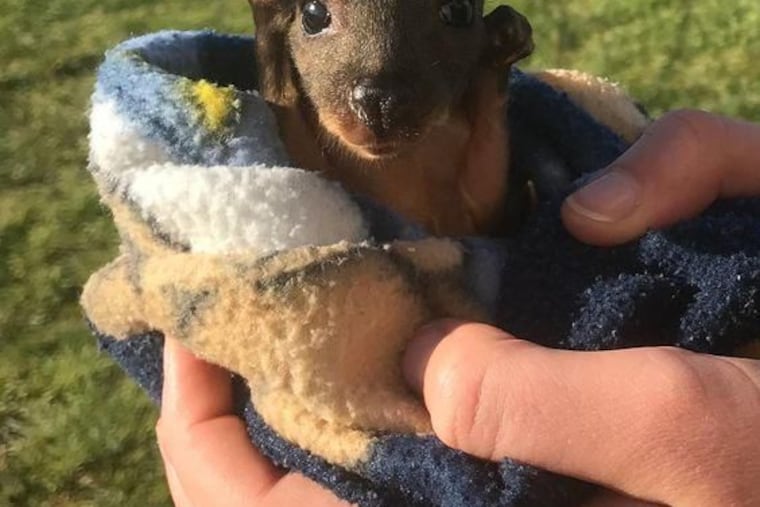Narberth crafters made pouches for Australia’s orphaned baby kangaroos and wombats
Philadelphia area crafters are making cozy pouches for wombats and wallabies orphaned or displaced by the Australia wildfires.

As bushfires ravage Australia, heartbreaking images are ricocheting around the world of burned or orphaned baby koalas, wombats and other native animals and birds displaced by flames that have devastated their habitats.
Spreading just as fast has been the worldwide response to save them.
Last month, the animals got an assist from the The Handwork Studio in Narberth. The studio, which teaches craft arts like knitting, sewing and woodworking to children, hosted two free workshops in which volunteers of all ages created comfort items for orphaned and injured animals.
For baby kangaroos, they made sling-like carriers, to be worn by human volunteers, to hold the orphaned joeys, who no longer have the protection of their mothers’ pouches. And for little wombats, they sewed up swaddling wraps. Both items help mimic the natural environments the marsupials use as they grow. The volunteers also knitted nests for displaced birds.
“We have closets full of fabric and yarn we were happy to use,” said Julia Yosen, 36, the Handwork Studio’s executive director. “This is our wheelhouse.”
Yosen and her staff were inspired to host the workshops after seeing a Facebook post from the Animal Rescue Collective Craft Guild of Australia, which creates items needed by animals affected by disaster. The guild was soliciting the efforts of crafters worldwide to help sew, knit, and weave the items, since the marsupials, especially, will likely need multiple pouches as they grow (the tiny critters are also known to chew and tear at the crafted items).
“It was compelling that people could help by doing the same things we do every day,” said Ana Castro, 29, the studio manager.
The volunteers created their items using instructions posted by the Australian collective and then worked with the Maine branch of the Rescue Collective Craft Guild, one of the regional U.S. coordinators of the relief effort, to make sure their donations get into the right hands.
For Adina Silberstein of Mt. Airy, who joined about 25 crafters at one of the sessions, the effort was personal. Her sister and family live in Adelaide, which sits along the country’s southern coast but has not been immediately affected by the fires. Silberstein, 44, has visited the country 17 times in 20 years.
“We go running in the hills and we see scores of kangaroos,” she said. “The koalas are harder to spot, but it’s very exciting when you do.”
» READ MORE: Fires set stage for irreversible forest losses in Australia
Silberstein, who owns Queenie’s Pets, a dog-walking and pet-sitting company, feels great empathy for the affected animals.
“They’re left not understanding what’s happening around them,” said Silberstein, who is planning an upcoming trip to Australia and will look for more volunteers opportunities while she’s there.
The workshop attendees ranged in age from five years to 70 and included Frankie Miller, 14, who has been attending Handwork camps for a number of years and already knows how to sew.
The Bala Cynwyd middle-schooler sewed pouches for orphaned kangaroos and wallabies, using both a unicorn fabric and a blue fabric, and gave high praise to the event’s instructors. Miller was also pleasantly surprised by the number of young children who participated in the event; it meant they were getting involved early in activism, which aligns with the teen’s own interest.
“I want to make a change in the world, even though I’m still young,” said Miller.
On the day of one of the workshops, the weather forecast was foreboding but the snow didn’t deter Emily Morgan, 41, who traveled to Narberth from Voorhees, N.J.. Her experience wasn’t without setbacks, however.
“I absolutely failed at knitting,” laughed Morgan about the bird’s nest she attempted to create. She did a quick pivot to sewing and was able to finish up a colorful kangaroo pouch.
The worldwide call for crafters’ help has been so successful that the Animal Rescue Collective Craft Guild of Australia has now posted a note asking volunteers to stand down.
“Rescues have enough pouches and medical supplies to treat the surviving animals (and sadly, there are not as many as we hoped),” the group posted. Indeed, an estimated billion animals, birds and reptiles have died in the fires, and few rare species will most likely go extinct. Now, the guild is asking for monetary donations to help feed the surviving animals whose habitats have been destroyed.
“Nothing will go to waste,” said Yosen about their surplus pouches and nests created at Handwork Studio. She believes there will be a continued need for such items in the future, since massive fires in Australia - and in the United States - are becoming a constant.
“These could go to California,” she said.